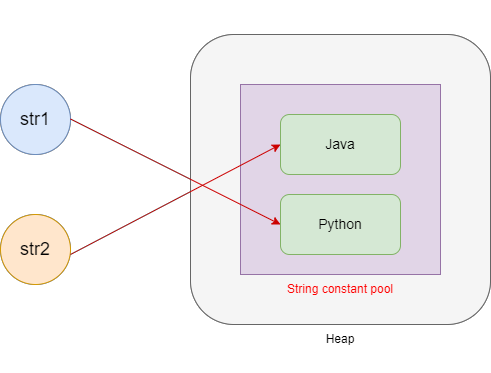Why Are Strings Immutable in Java? Ideal Practices and Usage Situations
Why Are Strings Immutable in Java? Ideal Practices and Usage Situations
Blog Article
What Is Immutable Strings and Exactly How It Functions
In the world of programs, understanding the principle of unalterable strings is extremely important for producing durable and secure applications. Immutable strings describe strings that can not be altered after they are produced, guaranteeing data integrity and predictability within the code. This fundamental concept plays an essential duty in various shows languages and uses an unique method to managing data. By exploring the intricacies of just how immutable strings operate, one can reveal a world of benefits and opportunities that can raise the top quality and efficiency of software program advancement.
The Basics of Unalterable Strings
Unalterable strings, as a basic concept in shows, are character sequences that can not be changed as soon as they are produced. This indicates that once a string is designated a value, that value can not be modified. In languages like Python and Java, strings are immutable items, causing numerous ramifications in terms of memory management and data integrity.
Among the vital benefits of unalterable strings is that they provide a feeling of security in data manipulation. Given that the material of an immutable string can not be modified, it ensures that the original data stays intact, minimizing the danger of unplanned adjustments during program implementation (Why are strings immutable in Java?). This home likewise streamlines debugging procedures, as programmers can rely on that when a string is specified, its worth will not be accidentally altered
When a brand-new string is created based on an existing one, rather than modifying the original string, the brand-new worth is kept separately. In general, comprehending the essentials of immutable strings is important for grasping programs principles and enhancing code performance.
Benefits of Unalterable Strings
Building upon the protection and efficiency benefits of unalterable strings, their advantages extend to enhancing code integrity and streamlining simultaneous programming tasks. By being unalterable, strings can not be customized after creation, which removes the threat of unintended changes in the information they keep. This fundamental immutability ensures that when a string is created, its worth stays constant throughout the program's execution, lowering the chances of pests triggered by unforeseen changes.
Furthermore, immutable strings add to code integrity by making it much easier to reason about the state of a program. Considering that strings can not be changed, programmers can trust that a string will constantly hold the same worth, simplifying debugging and maintenance efforts. This predictability leads to a lot more stable and trustworthy codebases.

Application in Shows Languages
Within different programs languages, the unification of immutable strings is an essential facet that affects how information is handled and adjusted within code structures. The implementation of immutable strings varies throughout various shows languages, with each language offering its very own systems to support this principle.

On the other hand, languages like C and C++ do not have integrated assistance for immutable strings. Developers in these languages have to manually implement immutability by enforcing rules within their code to protect against straight modifications to string objects.
Best Practices for Working With Immutable Strings
When dealing with immutable strings in shows languages like Java and Python, adhering to ideal methods guarantees efficient and safe data adjustment. One of the vital finest methods is visit this website to make use of StringBuilder or StringBuffer instead of straight manipulating strings, specifically when dealing with considerable concatenation operations. These classes provide mutable options for string control, helping to prevent unneeded memory allocations and improving efficiency.
Another best method is to use string interpolation or formatting operates provided by the language as opposed to hands-on concatenation. This not just improves readability however likewise aids in preventing typical challenges such as unintended string modifications. Furthermore, when collaborating with sensitive data such as passwords or API secrets, it is essential to stay clear of saving them as plain message in unalterable strings. Making use of protected storage mechanisms like char arrays or specialized collections for taking care of sensitive info aids minimize safety and security threats connected with immutable strings.
Real-world Applications and Instances
Exploring sensible executions of unalterable strings in different markets discloses their substantial impact on information honesty and system dependability. In the health care market, unalterable strings play an important duty in making sure the protection and privacy of client data. By protecting against unapproved adjustments to sensitive details such as medical records and prescriptions, unalterable strings assist keep compliance with rigorous personal privacy laws like HIPAA.
Financial establishments likewise take advantage of the immutable nature of strings to boost the protection of customer information and transaction records. Unalterable strings help stop fraud and unauthorized changes to economic information, supplying a robust protection against cyber risks and ensuring the depend on and self-confidence of customers.

Conclusion
Finally, immutable strings are fixed and unchangeable sequences of characters that provide advantages such as thread security and enhanced efficiency in programs. They are carried out in various shows languages to guarantee data honesty and security. Best practices for dealing with immutable strings include preventing direct modifications and making use of methods that return new string items. Real-world applications of unalterable strings include information file encryption, caching, and string control tasks.
Unalterable strings refer to strings that can not be changed after they are developed, making sure data integrity and predictability within the code. When a brand-new string is produced based on an existing one, instead than changing the original string, the new value is saved separately.In languages like Java and Python, strings are unalterable by default, indicating that once a string things is created, its value can not be changed - Why are strings immutable in Java?. Best methods for functioning with immutable strings consist of preventing direct modifications and using techniques that return brand-new string items. Real-world applications of immutable strings include information security, caching, and string manipulation jobs
Report this page